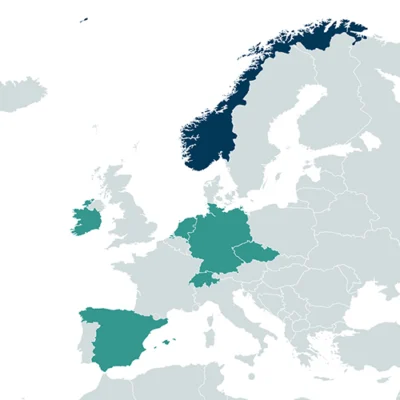Integrated Monitoring of Parasites in Changing Environments
Call
Duration
01/01/2024 – 31/12/2026
Total grant
approx. 900 thsd. €
More information
Rachel Paterson
rachel.paterson@nina.no
Partners of the project
- Department of Salmonid Fishes, Norwegian Institute for Nature Research, Trondheim, Norway
- Department of Invertebrates, Natural History Museum of Geneva, Geneva, Switzerland
- Marine & Freshwater Research Centre, Department of Natural Sciences, Atlantic Technological University, Galway, Ireland
- Department of Coastal Systems, NWO I – Royal Netherlands Institute for Sea Research, Texel, Netherlands
- Cavanilles Institute of Biodiversity and Evolutionary Biology, University of Valencia, Valencia, Spain
- Laboratory of Helminthology, Biology Centre of the Czech Academy of Sciences, Ceské Budejovice, Czech Republic
- Department of Aquatic Ecology, University of Duisburg-Essen, Essen, Germany
- Institute of Geography and Sustainability, University of Lausanne, Lausanne, Switzerland
- Department of Arctic and Marine Biology, UiT The Arctic University of Norway, Tromsø, Norway
- Department of Aquatic Ecosystem Research, University of Duisburg- Essen, Essen, Germany

Context
Parasites are typecast as biological villains due to their threats to human health and wildlife conservation, despite most metazoan parasites having no zoonotic potential, and constituting an overwhelming proportion of current biodiversity. Unsurprisingly, parasites remain the most neglected components of biodiversity management strategies, and completely absent from conservation discussions, unlike their more charismatic free-living hosts. Furthermore, the decline and disappearance of parasites is seldom a focus in long-term or distribution monitoring programs, and the value of parasites as integrative biological indicators remains under-exploited due to the lack of cost-effective monitoring tools for detecting broad-scale biodiversity changes.
Main objectives
IMPACT will address the overall goal of providing evidence-based knowledge to support the integration of parasites into aquatic biodiversity monitoring directives and environmental decision-making. Specifically, IMPACT will determine the spatial-temporal status and long-term trends of European freshwater fish parasite biodiversity; develop an innovative molecular tool kit for integrating fish parasite diversity assessments into aquatic biodiversity monitoring; and gain knowledge about stakeholders’ perceptions of parasites and their role in environmental governance.
Main activities
Key IMPACT activities include mapping the status and long-term trends of European freshwater fish parasite biodiversity; merging traditional monitoring techniques with eDNA technologies to support widespread parasite biodiversity monitoring in aquatic ecosystems; and elucidating the role of parasites in environmental governance. As a consequence, IMPACT will break down key barriers to the inclusion of parasites in transnational biodiversity and ecosystem change monitoring by co-developing a framework with environmental decision- makers to facilitate the explicit inclusion of parasites in national and international biodiversity management and conservation strategies.
Specific policy actions will include national policy briefs on the challenges and opportunities for integrating parasites in environmental governance, and a pan-European policy brief on lessons learned from IMPACT and advice on future collaboration and knowledge exchange for integrating parasites in biodiversity monitoring and conservation management policies.


